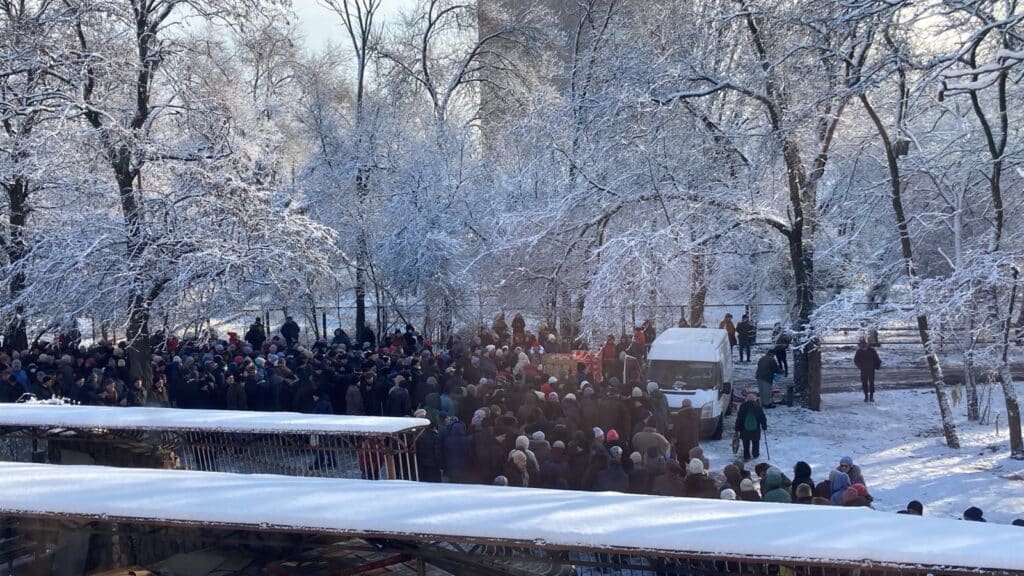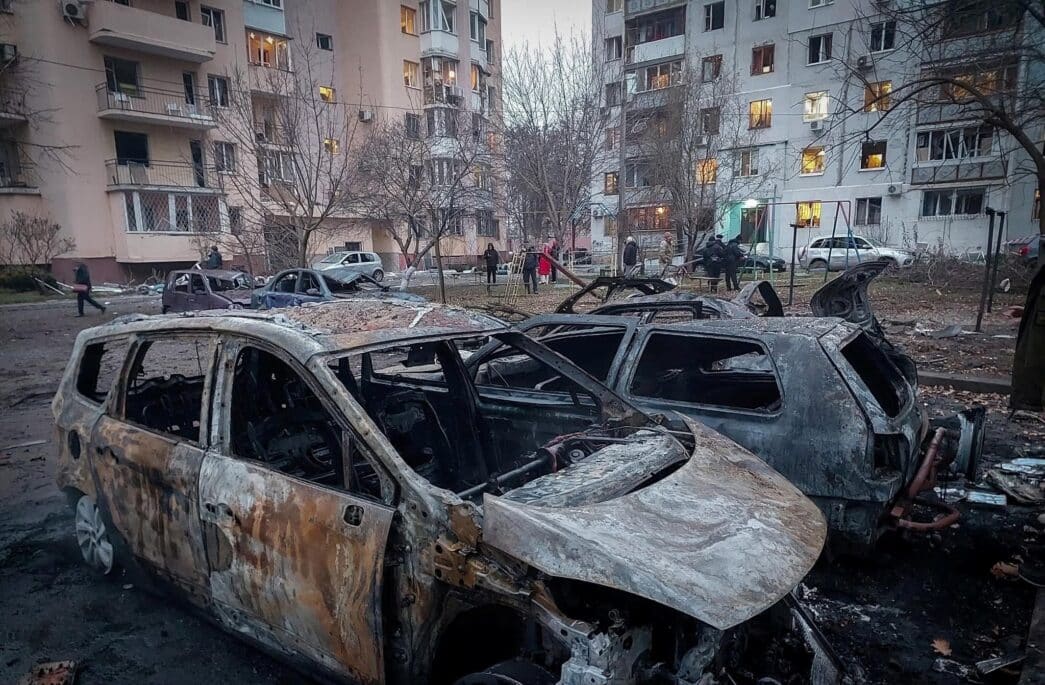KRAKOW, Poland (OSV News) — As Russia sent a barrage of rockets to Ukraine over the weekend of Feb. 1-2, a bishop living in an eastern Ukraine diocese on the front lines of war said such events make hope “rather waning” for his people.
But papal gestures and some perspectives for peace under the new U.S. presidential administration, he added, “flare up hope” as the country prepares for the third anniversary of the full-scale Russian invasion that started Feb. 24, 2022.
“They always hit most at night, counting on a lower capacity of Ukrainian soldiers’ vigilance,” Auxiliary Bishop Jan Sobilo of Kharkiv-Zaporizhzhia told OSV News Feb. 3.
Bishop Sobilo said that he was traveling from Zaporizhzhia to Kyiv late at night Oct. 31, as “the Shahed drones were flying and our soldiers were hunting them,” adding “it’s a real shootout to throw them down.”
The weekend cannonade started Jan. 30 in the middle of the night, as a Russian drone hit an apartment building in Sumy, killing at least six people — three older married couples — and wounding nine others, including a child, the region’s officials said.
Also at night, on Jan. 31, the historic city of Odesa was targeted as UNESCO-branded sites suffered from the Russian missile attack, injuring seven people and with debris falling close to the city’s famous 19th-century opera house. The historic Bristol hotel was hit, shattering glass and crumbling decorative elements in the splendid, ornamented interiors.
On Feb. 1, a Russian strike in Poltava killed at least seven people and injured 14 more, including three children, Ukraine’s Interior Ministry said, when another nighttime missile hit the apartment building.
Solidarity is comforting to Ukrainians amid attacks
The weekend nights throughout eastern Ukraine were heavy with sirens, wth Basilian Sister Lucia Murashko of the order’s Zaporizhzhia monastery telling OSV News in a Feb. 1 text message that while she and her fellow sisters were safe, “it was very hard to hear and think that someone suffered … every time we heard explosions.”
The sisters along with 80 children had narrowly escaped a Dec. 6 strike on Zaporizhzhia by Russian forces. The group was celebrating a Divine Liturgy at the time of that attack, which among other victims killed two adults known to the sisters.
“The suffering of Ukrainians really reaches to heaven,” said Cardinal Konrad Krajewski, prefect of the Dicastery for the Service of Charity, in a Feb. 2 comment for Vatican News. “You can see it in the graves of soldiers in their 20s and widows who come to them and pray with their young children for their husbands and fathers, and the entire cemetery is covered with national flags. So you just have to be with these people.”

Bishop Sobilo said that while hope is “rather waning” for the people of Ukraine as they reach a dark milestone of three years of full scale invasion on Feb. 24.
“This is the line for bread distributed at our sanctuary,” he said, sending a video of an endless crowd of people in line to get bread distributed in a local sanctuary. “Businesses are closed, jobs uncertain, people fell into poverty,” he said, explaining that four times a week 1,500 people wait in line in the freezing cold to get a loaf of bread.
But he also pointed out that one who lifts up the Ukrainian Catholics is Pope Francis and his constant “gestures of closeness and help pouring from Vatican charities.”
“You ask about hope — it is very much diminished when people experience strikes and see fresh graves at their cemeteries,” the bishop told OSV News, “but solidarity is lifting them up,” he said.
A ‘feeling of closeness to the Holy Father’
On Feb. 1 about 250 young people gathered in the Ukrainian Greek Catholic Cathedral of the Resurrection in Kyiv, as well as in Lutsk and Donetsk in Ukraine and in Warsaw, Munich, London, Chicago and Toronto, to speak to Pope Francis who connected to their meeting online.
“We could not invite more youth to follow us live — even though we would love to — because it was simply too dangerous,” Bishop Sobilo said of a meeting hosted by Archbishop Visvaldas Kulbokas, the Vatican nuncio to Ukraine and attended by Major Archbishop Sviatoslav Shevchuk of Kyiv-Halych, head of the Ukrainian Greek Catholic Church.

“We were prepared to go to the shelter at any moment, and spreading the news about the transmission could put the youth gathered there in danger of an attack,” he added.
“But everything went great, it was a really nice meeting that gave youth a lot of hope and a feeling of closeness of the Holy Father, who remembers about Ukraine every week during audiences and Angelus prayers,” Bishop Sobilo told OSV News.
“Pope Francis told the youth the story of a young soldier who died, and his fellow soldiers found a Scripture and rosary in his pockets. The young soldier prayed often and the pope told the youth to combine both, a love to God and a love to their homeland,” he said.
“It was like a good grandfather giving wise advice to his grandchildren,” Bishop Sobilo said, adding that Ukrainians desperately need such gestures of support.
“Many people are on the brink of endurance in Ukraine, some are very tired, but after such events as the one with the youth and the pope, there is a revival of hope that maybe God will give us the grace to live to see the day of victory after all.”
Looking at Trump’s presidency with hope
The bishop said that people are looking at the new U.S. administration with hope as well. “The sole fact that the American president talks about the ending of the war gives people hope,” Bishop Sobilo said, adding that “of course it all depends on what would be the conditions of this victory.”
Bishop Sobilo spoke after President Donald Trump said Jan. 31 that American and Russian officials were “already talking” about ending the war and that his administration has had “very serious” discussions with Russia.
The following day, president Volodymy Zelenskyy told The Associated Press that talks between the U.S. and Russia about the war in Ukraine without his country at the negotiation table would be “very dangerous” and asked for more discussions between Kyiv and Washington to develop a plan for a ceasefire, AP said.

“We need solidarity with Ukraine,” Bishop Sobilo said. “I thank everyone for something I call ‘information solidarity’ — for talking and writing about the suffering of Ukrainians and the massacres conducted by Russians here.”
He said the Jubilee Holy Door in the Sanctuary of God the Merciful Father in Zaporizhzhia has been opened since the extraordinary Jubilee of Mercy in 2015- 2016.
“When the whole world was closing its Jubilee doors in 2016, Pope Francis asked us to keep them open in Zaporizhzhia, because of the proximity of the frontline,” Bishop Sobilo said of the initial stage of the war after Russia occupied Crimea in 2014. “The pope wanted those doors open until the end of the war. This will be the case. The hope coming from God is always greatest,” he said, referring to the theme of the Jubilee of Hope 2025.
The fact that Ukrainians still cling to hope “Humanly speaking, it’s hard to understand, because I don’t think there’s any family out there in which someone hasn’t been killed, maimed or traumatized,” Cardinal Krajewski said. “And there is no hatred. There is great hope. They live in hope that this lawlessness will finally end, that this senseless war will end,” the papal almoner said.








